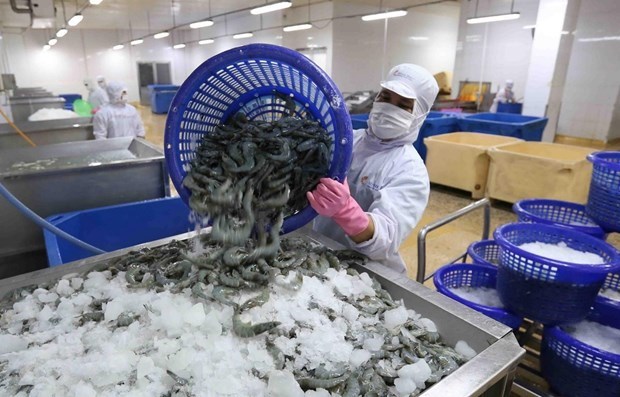 Economy
Economy

Despite the prolonged COVID-19 pandemic, shrimp exports have remained strong this year, also causing local retail prices to rise in the Mekong Delta.

|
| Cà Mau City has the largest number of shrimp processing and exporting businesses in the Mekong Delta. VNA/VNS Photo |
HCM CITY – Despite the prolonged COVID-19 pandemic, shrimp exports have remained strong this year, also causing local retail prices to rise in the Mekong Delta.
According to the Vietnam Association of Seafood Exporters and Producers (VASEP), in the first 10 months shrimp exports rose by 2.6 per cent to US$3.2 billion, with shipments to the US rising sharply.
The US accounted for 24 per cent of exports as they rose 25 per cent to nearly $1.7 billion.
The EU accounted for 12 per cent at $864 million after rising by 7 per cent, and South Korea accounted for 9 per cent at $643 million.
Exports to Japan fell by 7 per cent to $1.08 billion, and to China, by a whopping 24 per cent to $872 million.
Frozen small white shrimp, processed white-leg shrimp, fish balls, surimi, whole fillet, cut pieces, dried anchovies, and dried squid were some of the best-selling products.
Exports of frozen whole shrimp, especially tiger shrimp, decreased due to the high prices and tight control over frozen food imports in China.
According to experts and businesses, thanks to lifting of COVID restrictions in southern provinces and cities, supply chains have been re-established, with shrimp exports gradually recovering since October.
Besides, the fourth quarter is when demand for shrimp peaks in Europe and the US.
According to the Việt Nam Industry and Trade Information Centre, global demand for shrimp is generally on the rise, especially in large markets.
With supply from other countries still hit by the pandemic, Việt Nam’s exports are likely to rise enormously in the next few months due to the numerous free trade agreements it has and its production remaining steady.
Exports by delta provinces will remain high due to the many sales contracts businesses there have signed, but rising transport costs and potential COVID-related complications remain major challenges, according to many provinces.
Việt Nam targets shrimp exports of $4 billion this year. – VNS




